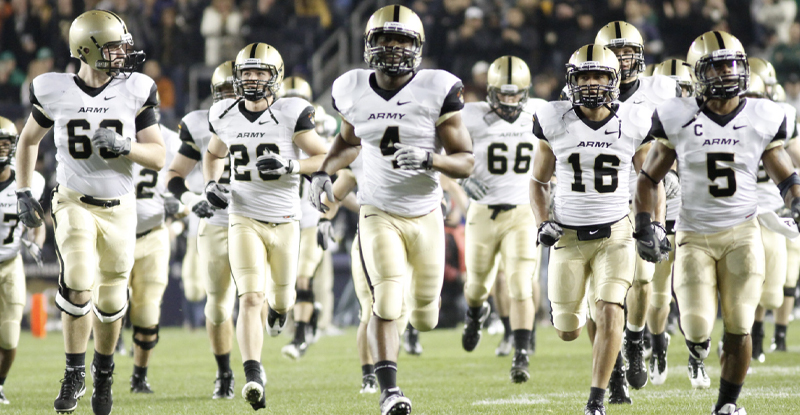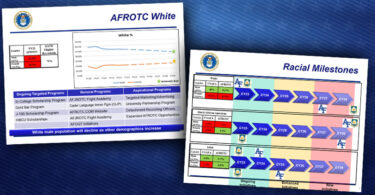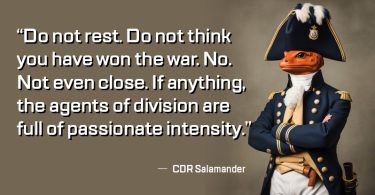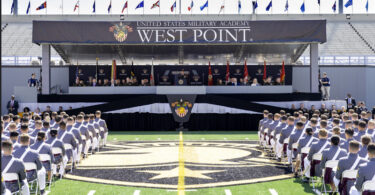By David Kane | Minding the Campus
Secretary Peter Hegseth’s first order to the Department of Defense promised “a focus on lethality, meritocracy, accountability, standards, and readiness.”
To the extent that the Service Academies—West Point, Annapolis, the Air Force Academy, the Coast Guard Academy, and the Merchant Marine Academy—take this directive seriously, they should end athletic admissions.
Such a move would change significantly who is admitted to the Service Academies and would certainly necessitate them, at the very least, dropping out of most NCAA Division I athletics.
“Athletic admissions” does not mean simply taking account of athletic participation in high school. It is possible, even likely, that candidates who played sports in high school, all else equal, make for better officers than those who did not.
Combat is physically demanding. High school athletics, along with other extra-curricular activities, count, and should count, positively for a candidate’s chances of admission.
At the Naval Academy, the overall admissions score, the Whole Person Multiple (WPM), measures high school athletic participation and achievements. The other academies do the same.
“Athletic admissions” means allowing a coach to play a major role in admissions decisions. This is systematic throughout elite education, including at the Service Academies.
Playing the Game: Inside Athletic Recruiting in the Ivy League by Chris Lincoln provides a detailed overview. In summary, each coach has a certain number of spots. That number varies by sport. Coaches can’t just admit anyone they want. Applicants must have some amount of academic talent, with thresholds varying by sport.
The admissions department might provide a final check—if only to avoid another Varsity Blues scandal in which coaches sold off admissions spots, including some to non-athletes.
But, subject to certain academic minimums, coaches make the decisions. Who knows better what the team needs? Who is better placed to evaluate athletic talent?
Duke Professor Peter Arcidiacono, in his expert testimony for the plaintiff in the legal case of Students for Fair Admissions, Inc. v. The United States Naval Academy, et al., provides many interesting details about athletic admissions at the Naval Academy.
The key category is what the Naval Academy calls Blue Chip Athletes (BCA). BCAs account for more than 18 percent of all admissions.
In the vast majority of cases, if a coach did not specify that he or she wanted a particular applicant because of his potential contribution to the team, that applicant would be rejected.
Although Arcidiacono does not provide this number explicitly, a little algebra demonstrates that Blue Chip Athletes have SAT Math + Verbal scores about 140 points lower than the rest of the admitted students.
Athletic admissions are inconsistent with a focus on “meritocracy” because they have no necessary connection to the merit we seek in our officers: the ability to lead troops in combat.
A critic might insist that being a high school quarterback demonstrates and develops precisely the sort of leadership and decision-making under pressure skills that are the hallmarks of a good officer. And that might be true!
Fortunately, the Service Academies have the data necessary to examine this question. They know who among their students were high school quarterbacks. They know who among their graduates were superior officers.
If there is a correlation between the two—as there is a correlation between IQ and officer success—then that correlation should be used to inform admissions decisions. And this is the reasoning for why high school athletic achievement plays a role in the calculation of the WPM.
But this data-driven process has nothing to do with how the Service Academies handle athletic admissions today. Even if it’s true that high school quarterbacks, all else being equal, make better officers, the football coach doesn’t admit 30 quarterbacks. The coach admits only a handful—just enough for the team. The same reasoning applies to all the other coaches.
They admit applicants who both a) meet the significantly lowered academic standards required by the admissions departments and b) contribute to team success.
However, a winning lacrosse record means nothing when the bugles sound for war.
Would ending athletic admissions require the end of athletics at the Service Academies? No!
Meritocratic admissions—meaning selecting the applicants most likely to make excellent officers—would undoubtedly lead to the enrollment of hundreds of students who played high school sports. If enough of them wanted to have a football or soccer team, there is nothing wrong with providing the facilities to support these and other extra-curricular activities.
But, as Chris Lincoln makes clear, it is simply impossible to field Division I teams in the vast majority of sports—most especially football and basketball—without significant admissions preferences, without admitting scores of applicants who you would otherwise reject.
Indeed, there is plenty of indirect evidence that the desire to field Division I football and basketball teams is the single most corrupting influence on admissions decisions.
For example, Blue and Gold Officers (BGO) are current or retired officers who supposedly interview all applicants. Their evaluations are incorporated into the overall WSM score. Yet, Arcidiacono reports that:
In contrast to other Blue Chip athletes, many of those in football and basketball (two-thirds) do not have a BGO interview. And when they do have a valid score, it seems like a placeholder: of the 75 Blue Chip athletes in football and basketball in 2027, four did not have an interview score, one was given a rating of above average, and 70 were given a rating of average.
Given Secretary Hegseth’s emphasis on “lethality” and “meritocracy,” is it likely that the Service Academies will end athletic admissions, that being an especially talented lacrosse player will stop counting for more than being highly likely to be a successful officer? I don’t know.
This topic would make for good questions for the upcoming confirmation hearings for the various under secretaries for manpower and reserve affairs in the different service branches, starting with retired Air Force Colonel Richard Anderson.
I am not hopeful. The same sociological forces which drive Yale to favor less academically talented lacrosse players affect admissions decisions at the Air Force Academy.
This will only change if Secretary Hegseth and his team make it happen.
First published on Minding the Campus








Leave a Comment